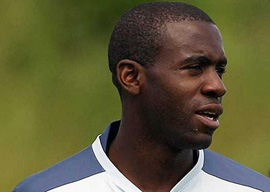
March 23, 2012

Fabrice Muamba
There was only one thing now that would make any difference to the young man’s life chances. Chelsea footballer Gary Cahill was among the first to divine what needed to be done”have the words “Pray” and “Muamba” and the numeral 4 printed on a shirt, then show that selfsame shirt to the cameras. Fellow players and viewers soon cottoned on, and within seconds, warm waves of psychic energy were rolling in from all postal districts toward a certain hospital bed in London E9.
The effects were immediate, trumping all that “round-the-clock intensive care by highly trained personnel. Worried watchers such as his fiancée became slightly less worried as the bombardment of blessings grew in volume and potency:
All your prayers are working people thank u so so much. Every prayer makes him stronger. To God be the glory.
Fabrice has felt every single prayer guys you”ve been INCREDIBLE!!!
The young lady’s strength of feeling is as laudable as it is predictable.
Bolton’s manager Owen Coyle was desperately anxious to see again his comrade’s “fantastic smile“ and ensure he doesn”t shuffle off this mortal Coyle:
Everybody is praying for Fabrice, which is very important.
Premier League chief executive Richard Scudamore reiterated the industry’s strategy in an interview:
We continue to pray.
The BBC’s Mark Easton asked,”Have you prayed for Fabrice Muamba today?” Easton’s interest was more scholarly”insofar as this area lends itself to rational examination. He referenced Galton’s celebrated 1872 paper Statistical Inquiries into the Efficacy of Prayer“which witheringly found it had none. Galton based his conclusion on the relatively short lives of monarchs, for centuries the chief recipients of the most fervent felicitations. So that he could tick the “balance” box, Easton also politely instanced a 1959 tome The Power of Prayer on Plants by one Franklin Loehr, who found that prayed-for plants did better than non-prayed-for ones”a fortunate finding, or else it might have made Loehr question his calling to the Presbyterian ministry. Easton also cited a 2004 BBC survey suggesting that some 60% of Britons still believe in a deity.
The warmth felt for Fabrice Muamba is genuine, and it does England great credit that so many are so concerned for this stricken stranger. Yet it is also superficial, and very soon the laser beam of love will be recalibrated on another recipient. But while it plays on him, it casts interesting light on England’s essential religiosity, a fact often overlooked in political debates. This impulse may presently be focused on football, but only because England’s impoverished public culture offers so few other outlets for faith. Football fanaticism is real, but it is a substitute for feelings otherwise forbidden to a fallen people.